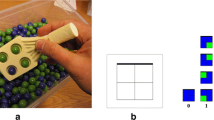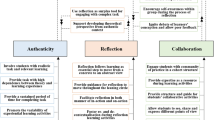Abstract
Learning design happens in collaboration with people. Our accountability to those people is nurtured through an understanding of the relationship between those people and the contexts they inhabit, as well as our own positions in the world. Issues of power and responsibility emerge from these relationships and positionings that impact our expectations, decision-making, and ultimately, our designs. Negotiating these relationships can be complex, demanding sensitivity, understanding, and transparency on the part of the designer. This chapter offers an introduction to the constructs at play when designers place accountability at the forefront of their work.
Access this chapter
Tax calculation will be finalised at checkout
Purchases are for personal use only
Similar content being viewed by others
References
Bivins, T. H. (2006). Responsibility and accountability. In K. Fitzpatrick & C. Bronstein (Eds.), Ethics in public relations: Responsible advocacy (pp. 19–38). SAGE Publishing.
Blackburn, M. V. (2014). Humanizing research with LGBTQ youth through dialogic communication, consciousness raising, and action. In D. Paris & M. Winn (Eds.), Humanizing research: Decolonizing qualitative inquiry with youth and communities (pp. 43–57). Sage Publishing.
Combahee Collective. (1983). The Combahee river collective statement. In B. Smith (Ed.), Home girls: A black feminist anthology (pp. 264–274). Rutgers University Press.
Crenshaw, K. (1989). Demarginalizing the intersection of race and sex: A black feminist critique of antidiscrimination doctrine, feminist theory, and antiracist politics. University of Chicago Legal Forum, 139–167.
Dick, W., Carey, L., & Carey, J. O. (2009). The systematic design of instruction (7th ed.). Pearson Education.
Finlay, L. (2008). Reflecting on “Reflective practice.” Practice-based professional learning paper 52. The Open University.
Freire, P. (1996). Pedagogy of the oppressed (revised). New York: Continuum, 356, 357–358.
Goulet, J. G. (1998). Ways of knowing: Experience, knowledge, and power among the Dene Tha. UBC Press.
Haraway, D. (1988). Situated knowledges: The science question in feminism and the privilege of partial perspective. Feminist Studies, 14 (3), 575–599.
Kinloch, V., & San Pedro, T. (2014). The space between listening and storying: Foundations for projects in humanization. In D. Paris & M. T. Winn (Eds.), Humanizing research: Decolonizing qualitative inquiry with youth and communities (pp. 21–42). Sage.
Lavalley, M. (2018). Out of the loop: Rural schools are largely left out of research and policy discussions, exacerbating poverty, inequity, and isolation. Center for Public Education.
Lawton, C., Kopcha, T. J., Walters, K., & Ocak, C. (2020). Digital, experiential, and embodied: Reckoning with the past in Putnam County, Georgia. ILCEA. Revue de l’Institut des langues et cultures d'Europe, Amérique, Afrique, Asie et Australie, (39).
MacDonald, M. (2021, February 18). UCLA to launch new social justice curriculum with $5 million grant from Mellon Foundation. Retrieved March 15, 2021, from https://newsroom.ucla.edu/releases/social-justice-curriculum-mellon-foundation-grant
McGrath, S. K., & Whitty, S. J. (2018). Accountability and responsibility defined. International Journal of Managing Projects in Business, 11(3), 687–707.
Morrison, G. R., Ross, S. J., Morrison, J. R., & Kalman, H. K. (2019). Designing effective instruction. Wiley.
Roberts, P. (2000). Education, literacy, and humanization: Exploring the work of Paulo Freire. Bergin & Garvey.
Rogoff, B. (2003). The cultural nature of human development. Oxford university press.
Schafft, K. A. (2016). Rural education as rural development: Understanding the rural school– Community Well-being linkage in a 21st-century policy context. Peabody Journal of Education, 91(2), 137–154.
Stefaniak, J. (2021). Determining environmental and contextual needs. In J. McDonald & R. West (Eds.), Design for learning (chapter 4). EdTechBooks.
Tessmer, M., & Richey, R. C. (1997). The role of context in learning and instructional design. Educational technology research and development, 45(2), 85–115.
Vygotsky, L. S. (1978). Mind in society: The development of higher psychological processes. Harvard University Press.
Walker, M. U. (2007). Moral understandings: A feminist study in ethics (2nd ed.). Oxford University Press.
Westerman, A. (2020, December 30). In 2020, protests spread across the globe with a similar message: Black lives matter. Retrieved March 15, 2021, from https://www.npr.org/2020/12/30/950053607/in-2020-protests-spread-across-the-globe-with-a-similar-message-black-lives-matt
Yamagata-Lynch, L. C. (2010). Activity systems analysis methods: Understanding complex learning environments. Springer Science & Business Media.
Author information
Authors and Affiliations
Corresponding author
Editor information
Editors and Affiliations
Rights and permissions
Copyright information
© 2023 The Author(s), under exclusive license to Springer Nature Switzerland AG
About this chapter
Cite this chapter
Walters, K., Kopcha, T.J. (2023). Accountability in Learning Design and Research as an Ongoing Practice. In: Hokanson, B., Exter, M., Schmidt, M.M., Tawfik, A.A. (eds) Toward Inclusive Learning Design. Educational Communications and Technology: Issues and Innovations. Springer, Cham. https://doi.org/10.1007/978-3-031-37697-9_9
Download citation
DOI: https://doi.org/10.1007/978-3-031-37697-9_9
Published:
Publisher Name: Springer, Cham
Print ISBN: 978-3-031-37696-2
Online ISBN: 978-3-031-37697-9
eBook Packages: EducationEducation (R0)




